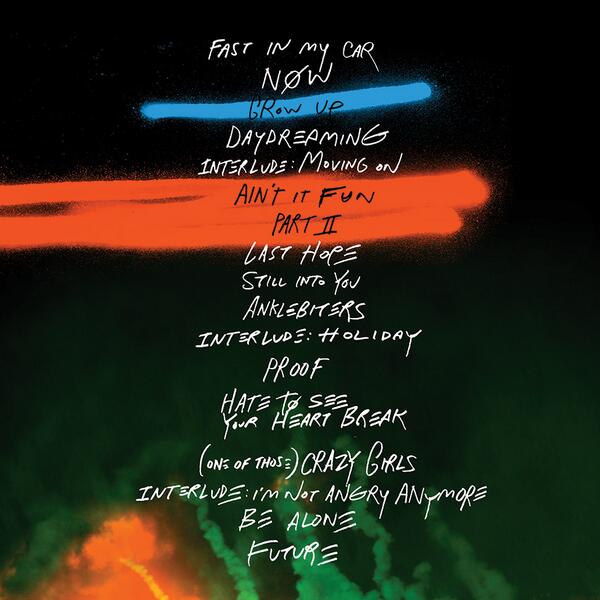


On such a long album, it really wouldn't have hurt to cut a couple songs. While clearly not album-breaking, these two easily stop the entire album from being the best album they've put out. On the same disc that we have masterpieces like "Future" and "Last Hope" (more on those later), we have songs like the grating "Grow Up" and generic "Proof," that, while not bad, represent the worst of Paramore's catalog. It's not only the most wildly varied Paramore album in terms of genre, but also in quality. One thing I will readily admit is a problem with the record is its inconsistency. Some will find it frustrating, I find it refreshing and important in keeping audience interest throughout the colossal 64-minute-long album. This type of genre-switching is common throughout the album. The synths, walls of guitars, and bombastic choruses would've already made this track a winner, but when it all melts away and builds back up into a glorious and breathtaking bridge is when it earns its place in the category of Paramore classics. A literal sequel to the fan-favorite "Let the Flames Begin," it serves as a whammy of scope and musical complexity. The gospel-tinged "Ain't it Fun" breezes along with it's nagging guitar line and massive scope as an entire choir comes in to join in the self-deprecating fun, and then immediately cuts into "Part II", a completely different yet absolutely familiar song for Paramore. Yes, variety just absolutely permeates the entire album. Surely Paramore knew this, which is probably why they sprinkled two other so-called "Interludes" throughout the album, "Holiday" and "I'm Not Angry Anymore." Both of these tracks are just as pretty and likable to those with an open ear as the first and are a welcome break from some of the heavier sounds and emotions throughout. In fact, the first major game changer - nothing like anything we've ever heard from Paramore before - comes along at five songs in with "Moving On: Interlude." This sun-dappled ukulele tune was sure to alienate some of the diehards, and alienate it did. Even the opener "Fast in My Car," while admittedly a bit jarring with it's thudding percussion and waves of weird distortion, comes across as just a different shade of the band we've heard before. Songs like "Now" and "Anklebiters" are refreshing for those who love the same-old same-old Paramore, the heavy guitars mixed with the surprisingly poppy and memorable melodies and choruses in the combination we know and love. From the heavy alternative of "All We Know Is Falling" to the pop-punk spike of "Riot!", nothing had led us to expect what their self-titled album would be. It was nothing like what we'd come to expect from Paramore as we knew them. The album, by nature, rubs fans the wrong way. Review Summary: I know I'll be crucified for this, but.


 0 kommentar(er)
0 kommentar(er)
